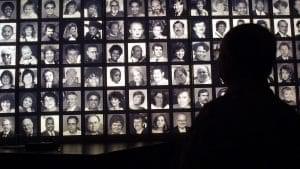
On April 19, 1995, the course of modern American political and cultural dialogue altered irreparably with the bombing of the Alfred P. Murrah Federal Building in Oklahoma City. Though there are many individuals in the latter decades of the 20th Century that left indelible marks on the landscape of the United States, Timothy McVeigh almost single-handedly committed one of the worst acts of domestic terrorism in American history. Barak Goodman (following up his exceptional 2015 mini-series Cancer: The Emperor of All Maladies) commands a unique revisitation on the times and crimes of McVeigh in Oklahoma City, providing a wide-ranging scope that effectively informs and emotes without overly retreading territory explored in extensive related works.

“…an utterly resonant atmosphere…aching with dramatic tension.”
After a low-rent David Fincher-esque opening credit sequence, the showcasing of the grotesque reality of the bombing through stock footage and newsreels sets the tone, time and place of this story. The journey is primarily steered via traditional interviews and analysis from a large swath of victims, acquaintances, police, rescue workers, historians, writers, and political analysts. Instead of directing a complete focus on just McVeigh, the filmmakers provide stellar context by exploring a series of events ranging from the rise of modern American white supremacist groups and their associated ideology, the stand-offs between dogmatic citizens and federal law enforcement at Ruby Ridge and Waco, and how all of this directly contributed to the Oklahoma City bombing. Each arc (roughly 20-30 minutes each) is punctuated by returning to the bombing with newer perspectives and information so that very little is unnecessarily retreaded, and greater understanding of the bombing’s context can be achieved.
The original cinematography by the eclectic Stephen McCarthy is thoroughly effective, though rarely straying outside the bounds of convention. David Cieri provides a nuanced and subliminal score, creating an utterly resonant atmosphere which is respectful to the events and people showcased yet aching with dramatic tension. Editor Don Kleszy manages to craft a seamless flow to the story, though his consistent maintenance of standard structural norms neuters the potential immersion that the footage and music promise, he easily dodges offbeat pacing and uneven tonal shifts. Kevin Peters provides a well-mixed audio track that maintains a constant volume and clarity, sliding from one interviewee to the next without any hiccups in quality or rhythm. Goodman continually emphasizes an obvious focus on the insular culture of white supremacy and gun fanaticism, concluding with statistics from the Southern Poverty Law Center as to how numerous the groups like those who reared and inspired McVeigh are in contemporary America.

“…revisiting one of the country’s most tragic acts of terrorism.”
Though its composition of the subject matter is not too uncommon, the docu remains unique due to the expansive knowledge and perspectives utilized to prove its central themes. By deploying strict inductive reasoning throughout his research, Goodman posits this singular event is endemic of the rising tide of radical political extremism in America, and that McVeigh was not the apex of this wave, but one of the continuing fuels. An idiosyncratic experience revisiting one of the country’s most tragic acts of terrorism, Oklahoma City is far more a commentary than historical document, and acts more as an opening to discourse rather than a slam-shut case study.

Oklahoma City (2017) Directed by Barak Goodman. Written by Barak Goodman. Starring Janet Beck, Jim Botting, Bill Buford, Claudia Denny, Jim Denny, Ben Fenwick, Jerry Flowers.
★★★½ / ☆☆☆☆☆

